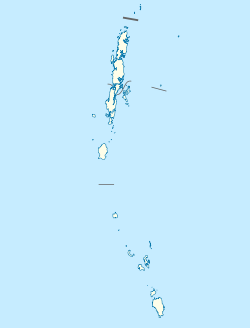Shompen hut is a village in the Nicobar district of Andaman and Nicobar Islands, India. It is located in the Great Nicobar tehsil.[1]
Shompen hut | |
|---|---|
village | |
| Coordinates: 7°00′47″N 93°55′55″E / 7.013°N 93.932°E | |
| Country | India |
| State | Andaman and Nicobar Islands |
| District | Nicobar |
| Tehsil | Great Nicobar |
| Population (2011) | |
• Total | 63 |
| Time zone | UTC+5:30 (IST) |
| 2011 census code | 645198 |
History
editThe Shompen Hut complex was built by the Government of India in 1984, at the 27th km point on the East-West road connecting Campbell Bay to Kopen Heat (Copenheat) Nicobarese village.[2] The objective was to provide health, education and other services to the Shompen people. However, members of the Shompen tribe did not visit the complex frequently.[3] A horticultural garden was also developed at the site.[4]
Demographics
editAccording to the 2011 census of India, Shompen hut has 14 households. The effective literacy rate (i.e. the literacy rate of population excluding children aged 6 and below) is 0%.[5]
| Total | Male | Female | |
|---|---|---|---|
| Population | 63 | 35 | 28 |
| Children aged below 6 years | 0 | 0 | 0 |
| Scheduled caste | 0 | 0 | 0 |
| Scheduled tribe | 63 | 35 | 28 |
| Literates | 0 | 0 | 0 |
| Workers (all) | 1 | 0 | 1 |
| Main workers (total) | 1 | 0 | 1 |
| Main workers: Cultivators | 0 | 0 | 0 |
| Main workers: Agricultural labourers | 0 | 0 | 0 |
| Main workers: Household industry workers | 0 | 0 | 0 |
| Main workers: Other | 1 | 0 | 1 |
| Marginal workers (total) | 0 | 0 | 0 |
| Marginal workers: Cultivators | 0 | 0 | 0 |
| Marginal workers: Agricultural labourers | 0 | 0 | 0 |
| Marginal workers: Household industry workers | 0 | 0 | 0 |
| Marginal workers: Others | 0 | 0 | 0 |
| Non-workers | 62 | 35 | 27 |
References
edit- ^ "Andaman and Nicobar Islands villages" (PDF). Land Records Information Systems Division, NIC. Retrieved 25 July 2015.
- ^ Rann Singh Mann (1 January 2005). Andaman and Nicobar Tribes Restudied: Encounters and Concerns. Mittal Publications. p. 177. ISBN 978-81-8324-010-9.
- ^ India. Planning Commission (1 January 2008). Andaman and Nicobar Islands, Development Report. Academic Foundation. pp. 103–. ISBN 978-81-7188-652-4.
- ^ Sarit Kumar Chaudhuri; Sucheta Sen Chaudhuri (2005). Primitive Tribes in Contemporary India: Concept, Ethnography and Demography. Mittal Publications. pp. 23–. ISBN 978-81-8324-026-0.
- ^ a b "District Census Handbook - Andaman & Nicobar Islands" (PDF). 2011 Census of India. Directorate of Census Operations, Andaman & Nicobar Islands. Retrieved 21 July 2015.

